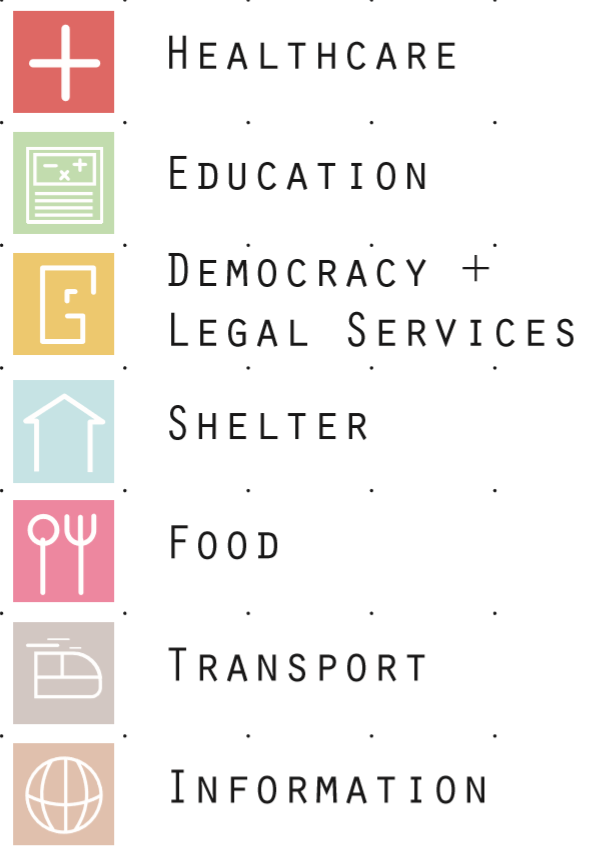Universal basic services – is this the answer to poverty?
Posted on 29 May 2018 Categories: Blog, From Rethinking Poverty, New economic models, Social Security, The state we want
by Caroline Hartnell
‘Focusing on basic services, such as housing, food, communications and transport, is, we conclude, far more effective at driving down the cost of living than spending the same money on existing services, or on redistribution.’
Henrietta Moore, Social prosperity for the future: A proposal for Universal Basic Services
Universal basic income …

Basic income, or UBI, has a long history. According to Wikipedia, ‘The idea of an unconditional basic income, given to all citizens in a state (or all adult citizens), was first presented near the middle of the 19th century.’ In its purest form, basic income is paid regardless of recipients’ other income, and citizens have no obligation to work.
There is a lot of interest in the idea currently. Recently experiments have been carried out in India, Canada and Finland, and four Scottish cities are set to conduct a pilot this year. UBI, or citizens’ basic income, is one of the ideas put forward in Barry Knight’s book Rethinking Poverty: What makes a good society? as a ‘promising area for further work’.
But UBI raises many questions. How do you provide all citizens with a decent income without astronomical cost? The answer, progressive taxation, isn’t one that is likely to be politically acceptable any time soon. If all citizens do receive a basic income, won’t this undermine people’s incentive to work? In a recent blog Chris Goulden of Joseph Rowntree Foundation argues that, far from being the answer to poverty, UBI will actually increase poverty ‘unless modified beyond recognition’.
… or Universal Basic Services?
An alternative has recently emerged in the form of universal basic services – UBS. In October 2017, the Social Prosperity Network (SPN), part of UCL’s Institute for Global Prosperity (IGP), launched a new report called Social prosperity for the future: A proposal for Universal Basic Services.
UBS is deliberately posed as an alternative to UBI. The basic question: is it better to give everyone a set amount of money each year or to guarantee all of the public services people need to live a full life? While UBI can be seen as a simple solution to a complex problem, UBS is a complex solution to a complex problem. ‘Universal income or universal basic services?’ was the title of a recent New Economics Foundation podcast.
The basic idea of UBS is to expand universal (not necessarily free) services to enable universal safety, opportunity and participation. ‘A larger life for the ordinary person’ is how SPN co-director Andrew Percy sums up the vision. IGP director Henrietta Moore describes it as ‘the blueprint for an enhanced but affordable social safety net’.
‘A larger life for the ordinary person’
The initial focus will be on food, shelter, information and transport. The report’s recommendations include a massive expansion of social housing, free bus travel, meal provision for those most at risk of food insecurity and basic phone and internet access. The total cost of £42 billion – representing just 2.3 per cent of UK GDP – could be fully funded through changes to the Personal Allowance, the report maintains, making the proposal fiscally neutral. Polly Toynbee describes the Labour Party’s newly adopted policy to give free bus passes to the under-25s as ‘a tiptoe towards universal basic services’.
So is it the answer for addressing poverty? Given that the report – and the idea – was only launched in October last year, there are inevitably some questions to be answered.
Why services?

Why give services rather than money, which would enable people to make their own choices? Services flow directly to meet need in a way that cash doesn’t easily do, so providing services is more cost-effective. People will avail themselves of new or improved services only if they actually need them. Take food. People will go to food banks only if they are going hungry; there is no suggestion that everyone will be free to clear off the shelves at Waitrose.
There is also an equity argument to be made. More work is needed on the redistributive effects of UBS, but the report calculates that those in the lowest income decile would benefit the most – saving the equivalent of £126 per week in costs as a ‘social wage’ if they accessed all the basic services.
Who will provide the services?
Are we talking about local community initiatives or business/private funding of initiatives or state provision? Or all of the above? Bottom-up community initiatives represent a great way to develop new approaches, but how do we ensure provision is universal? The state will clearly have to be involved in some way if this is to happen. UBS implementation needs to be both bottom-up and top-down, with a transformed state giving resourceful communities the support they need.
Why food?
How does food fit within the UBS approach? Doesn’t food, like clothing, come more into the area of personal choice – though meals on wheels, hospital meals, school meals, etc lend themselves to public provision. While health, education and childcare can be provided as services, food is more complicated (as is housing) – though the realities of underfed children and the consequences for their development can’t be ignored. Even a term like ‘nutrition’ is problematic because it focuses solely on the utilitarian aspects of food, neglecting preferences, personal choice and the social significance of food.
One question that arises from this discussion of food is: what do we mean by a need? Before any expansion of the scope of UBS, it would be helpful to have some more rigorous criteria.
It would also be helpful to have some case studies to illustrate different approaches. What would existing projects do differently if they had more money? Aditya Chakrabortty’s Guardian series ‘The Alternatives’ presents some inspiring examples demonstrating great resourcefulness, and there are many more out there, but much more is needed.
To follow what is happening with UBS, sign up with the UBS Hub, which aims to provide a central space for coordinating activity.
Caroline Hartnell convenes the Rethinking Poverty blog.
- Read Chris Goulden’s piece, ‘Universal Basic Income – not the answer to poverty’
Posted on 29 May 2018 Categories: Blog, From Rethinking Poverty, New economic models, Social Security, The state we want
